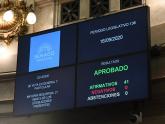Watch VIDEO. The reform of the Federal Fishing Regime, promoted by the National Government, considerably increases the sanctions and fines for those who fish illegally in Argentine waters, including those around the Malvinas Islands.
The initiative, which had been developed jointly by the Ministries of Foreign Affairs and Agriculture, was passed unanimously in both the Chamber of Deputies and the Senate during the sessions held on September 2 and 16.
“It constitutes another step in the defense of national sovereignty”, said Foreign Minister Felipe Solá, who argued that updating the Fisheries Law “will prevent the plunder of our sea, by raising sanctions and fines for those who engage in illegal fishing in Argentine waters”. In addition, he added that “it will also strengthen the work of the roundtable that has been made up by the Ministries of Defense, Security, Agriculture and Foreign Affairs, with the aim of defending our sovereign presence and economic activity, and protecting the natural resources of the Argentines”.
Solá recalled that “the fines that were applied until today had been established in 1998 and it was necessary to update them because they were absurdly low”.
For his part, the Secretary of the Malvinas, Antarctica and South Atlantic, Daniel Filmus, stated that the new law “seeks to act as a deterrent that allows to collaborate with the effective conservation and management of the fishery resources that belong to the 45 million Argentines, in addition to strengthening the sovereignty of our country over the South Atlantic, including the waters that surround the Malvinas Islands”.
The new law incorporates a variable fine regime based on value units linked to the cost of fuel, with equivalent amounts ranging from 500 thousand to 3 million liters of diesel, according to the severity of the crime, with a minimum of 25 million pesos and a maximum of 150 million pesos, considering current market values.
In the case of foreign vessels, the applicable penalty is the highest since these are vessels that fish without permission from Argentina. Additionally, the enforcement authority may order the capture and retention of the foreign flagged vessel in port until, after substantiation of the respective summary, the payment of the fine becomes effective.
Unlike the previous system, the offender will have to take charge of all the expenses incurred by the National State based on their capture, with no limit on the type of expense or amount.
Another sanction that was established in the law and is maintained is the confiscation of the warehouse (of everything that has been caught), unless the offender chooses to deposit the amount of the merchandise.
With the approval of this law, the National Congress signed into law the three initiatives sent by President Alberto Fernández on the Malvinas, South Georgia and South Sandwich Islands and the surrounding maritime areas. The other two proposals established the creation of a National Advisory Council on Policies relative to Malvinas and the demarcation of the outer limit of the continental shelf.


